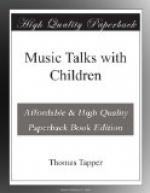I. Listening comes from concentration.
II. When listening to great
music it must be with reverence as well
as with
attention.
III. We must listen for ideals.
IV. We must listen in order to be self-critical.
V. Constant listening to true
music reveals that there is never a
tone used
unless it has a meaning.
And besides all this we must think that among those who listen to us there may be some one who has learned this careful concentrated way. Then we shall have it ever in mind to “play as if in the presence of a master."[20]
CHAPTER VI.
THINKING IN TONE.
“The gods for labor sell us all good things.”—Epicharmus.[21]
Perhaps you have some doubt as to exactly what is meant by music-thinking. Being somewhat acquainted with composers and with music, the thought may here come to you that all the music we hear in the world must have been made by somebody—by many somebodies, in fact. They have had to sit down, and forgetting all things else, listen intently to the music-thought which fills the mind. If you will sit quietly by yourself you will discover that you can easily think words and sentences and really hear them in the mind without pronouncing anything. In quite the same way the composer sits and hears music, tone by tone, and as clearly as if it were played by a piano or an orchestra. And to him the tones have a clear meaning, just as words have a clear meaning to us. Naturally, one can see that there could be no other way. Unless the composer can think out everything exactly there could be no music, for music must be written, and one can only write what one thinks. So at this point the thought to remember is this: Music must exist in some one’s mind before others can have it to hear and enjoy.
In like manner—just the same manner, in fact—the painter is one who thinks pictures; the sculptor, one who thinks statues; the architect, one who thinks buildings. They think these things just as you think words; and as you tell your thoughts in spoken words, so they tell their thoughts in printed music, in painted pictures, in chiseled statues, and in erected buildings. Now, from all this it should be clear to you that there can be nothing which has not first been thought of by some one. You think the door must be closed and you close it; you think you must know the time and you look at the clock; you think the one hand should play more loudly than the other and you try to do it.
Power to get things and to do things comes to us rapidly only in the fairy-tales. In the real, beautiful, healthy world in which we live we have to work hard and honestly for the power either to get things or to do things. By faithful labor must we win what we want. What we do not labor for we do not get. That is a condition of things so simple that a child can readily understand it. But all, children and their elders, are apt to forget it. In the life of every great man there is a story different from that of every other great man, but in every one of them this truth about laboring for the power one has is found.




